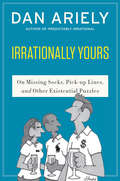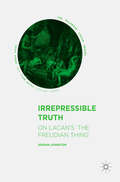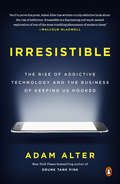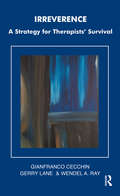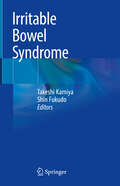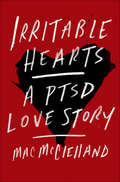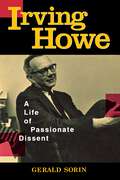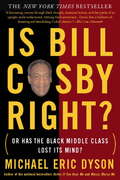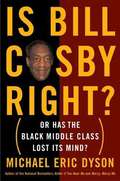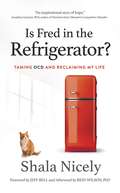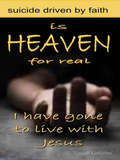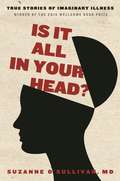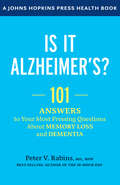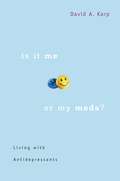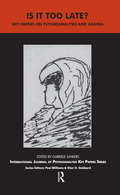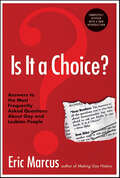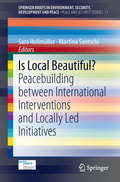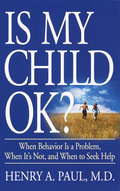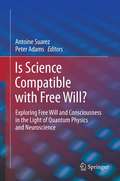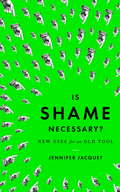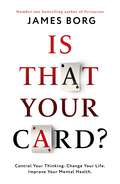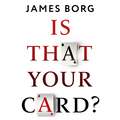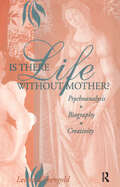- Table View
- List View
Irrationally Yours: On Missing Socks, Pickup Lines, and Other Existential Puzzles
by Dr Dan Ariely William HaefeliNew York Times bestselling author Dan Ariely teams up with legendary New Yorker cartoonist William Haefeli to present an expanded, illustrated anthology of his immensely popular Wall Street Journal advice column, "Ask Ariely."Social scientist Dan Ariely revolutionized the way we think about ourselves, our minds, and our actions in his books Predictably Irrational, The Upside of Irrationality, and The (Honest) Truth About Dishonesty. Ariely applies this scientific analysis of the human condition in his "Ask Ariely" Q&A column in the Wall Street Journal, in which he responds to readers who write in with personal conundrums, ranging from the serious to the curious. What can you do to stay calm when you're playing the volatile stock market? What's the best way to get someone to stop smoking? How can you maximize the return on your investment at an all-you-can-eat buffet? Is it possible to put a price on the human soul? Can you ever rationally justify spending thousands of dollars on a Rolex?With their trademark insight and wit, Ariely and Haefeli help us reflect on how we can reason our way through external and internal challenges. Readers will laugh, learn, and, most important, gain a new perspective on how to deal with the inevitable problems that plague daily life.
Irrepressible Truth
by Adrian JohnstonThis book offers readers a uniquely detailed engagement with the ideas of legendary French psychoanalyst Jacques Lacan. The Freudian Thing is one of Lacan's most important texts, wherein he explains the significance and stakes of his "return to Freud" as a passionate defence of Freud's disturbing, epoch-making discovery of the unconscious, against misrepresentations and criticisms of it. However, Lacan is characteristically cryptic in The Freudian Thing. The combination of his writing style and vast range of references renders much of his thinking inaccessible to all but a narrow circle of scholarly specialists. Johnston's Irrepressible Truth opens up the universe of Lacanian psychoanalysis to much wider audiences by furnishing a sentence-by-sentence interpretive unpacking of this pivotal 1955 essay. In so doing, Johnston reveals the precision, rigor, and soundness of Lacan's teachings.
Irresistible: The Rise Of Addictive Technology And The Business Of Keeping Us Hooked
by Adam AlterWelcome to the age of behavioral addiction—an age in which half of the American population is addicted to at least one behavior. We obsess over our emails, Instagram likes, and Facebook feeds; we binge on TV episodes and YouTube videos; we work longer hours each year; and we spend an average of three hours each day using our smartphones. Half of us would rather suffer a broken bone than a broken phone, and Millennial kids spend so much time in front of screens that they struggle to interact with real, live humans. In this revolutionary book, Adam Alter, a professor of psychology and marketing at NYU, tracks the rise of behavioral addiction, and explains why so many of today's products are irresistible. Though these miraculous products melt the miles that separate people across the globe, their extraordinary and sometimes damaging magnetism is no accident. The companies that design these products tweak them over time until they become almost impossible to resist. By reverse engineering behavioral addiction, Alter explains how we can harness addictive products for the good—to improve how we communicate with each other, spend and save our money, and set boundaries between work and play—and how we can mitigate their most damaging effects on our well-being, and the health and happiness of our children.Adam Alter's previous book, Drunk Tank Pink: And Other Unexpected Forces that Shape How We Think, Feel, and Behave is available in paperback from Penguin.
Irreverence: A Strategy for Therapists' Survival (The Systemic Thinking and Practice Series)
by Bradford P. Keeney David Campbell Ros Draper Gianfranco Cecchin Gerry Lane Wendel A. RayIrreverence: A Strategy for Therapists' Survival marks the end result of a collaboration between three creative and highly respected therapists and writers in the family therapy field. It continues the tradition of the Milan group and later systemic thinkers by examining the way a therapist's own thinking can block the process of therapy and lead to feeling stuck. The authors define and demonstrate the use of a concept in the therapeutic field - irreverence - which allows therapists to free themselves from the limitations of their own theoretical schools of thought and the familiar hypotheses they apply to their client families. They illustrate their ideas with some very challenging family therapy cases and include an interesting consultation with the staff caring for a hospitalised patient. The book also extends the notion of irreverence beyond therapy to the fields of training and research where its application is both fresh and profound.
Irritable Bowel Syndrome
by Takeshi Kamiya Shin FukudoThis edited book brings together 5 general themes of irritable bowel syndrome (IBS), presenting the latest information on the epidemiology, pathophysiology, diagnosis, treatment and a number of current topics. IBS is a functional bowel disorder associated with chromic abdominal pain and altered bowel habits without identifiable organic etiology, however, to date there is no known, agreed-upon disease mechanism. This book offers insights into the various factors potentially contributing to the symptoms, and provides data on the various globally recognized strategies, including novel pharmacological treatment agents. It also discusses geographical differences and region-specific factors such as medical systems, life styles, dietary habits, gut microbiota, social stress, and genetics. The book promotes further exploration of the disease by offering a comprehensive bibliography for each chapter. It is a valuable and thought-provoking resource for clinicians, researchers, residents and PIs who are interested in the latest basic and clinical research on IBS.
Irritable Hearts: A PTSD Love Story
by Mac McClellandAn award-winning journalist explores the pain of bearing witness: “A valuable portrait of what it is like to live with PTSD . . . striking candor.” —The New York Times Book ReviewBack in California after reporting on Haiti’s devastating 2010 earthquake, Mac McClelland can’t stop reliving vivid scenes of horror. She’s plagued by waking terrors, violent fantasies, and crippling emotional breakdowns. She can’t sleep or stop crying.It becomes clear that she’s suffering from post-traumatic stress disorder. Her bewilderment about this sudden loss of control is magnified by the intensity of her feelings for Nico—a French soldier she met in Port-au-Prince and with whom she connected instantly and deeply.In this book, the foreign correspondent tackles perhaps her most harrowing assignment to date: investigating the damage in her own mind. She probes the depths of her illness, explores our culture’s history with PTSD, delves into the latest research, and spends time with veterans and their families. She learns that while we associate PTSD with wartime, it is more often caused by other types of trauma, and can even be contagious. Irritable Hearts is a searing, personal medical mystery that unfolds at a breakneck pace. But it is also a love story, as McClelland fights desperately to repair her heart so she can give it to the kind, patient, and compassionate man with whom she wants to share a life. Ultimately, it is a remarkable exploration of vulnerability and resilience.“Unforgettable.” —Roxane Gay, New York Times–bestselling author of Hunger“[A] deft, emotionally engaged memoir . . . As much as the love story at the heart of the book is a great romance, it’s also a very funny one. McClelland is not the sort of person who needs to idealize either herself or the man who became her husband. It’s a grown-up relationship story. And as a bonus, Irritable Hearts has a section on trauma and triggers that adds useful context to many of our present debates about discourse on the Internet.” —The Washington Post“McClelland pulls back a dark, heavy curtain on the costs paid by those who travel to the far corners of the planet to gather difficult news on difficult subjects . . . Writing like this takes courage, perhaps as much—or even more—than reporting from a war-ravaged land.” —San Francisco Chronicle
Irving Howe: A Life of Passionate Dissent
by Gerald SorinA New York Times “Books for Summer Reading” selectionWinner of the 2003 National Jewish Book Award for HistoryBy the time he died in 1993 at the age of 73, Irving Howe was one of the twentieth century’s most important public thinkers. Deeply passionate, committed to social reform and secular Jewishness, ardently devoted to fiction and poetry, in love with baseball, music, and ballet, Howe wrote with such eloquence and lived with such conviction that his extraordinary work is now part of the canon of American social thought.In the first comprehensive biography of Howe’s life, historian Gerald Sorin brings us close to this man who rose from Jewish immigrant poverty in the 1930s to become one of the most provocative intellectuals of our time. Known most widely for his award-winning book World of Our Fathers, a rich portrayal of the East European Jewish experience in New York, Howe also won acclaim for his prodigious output of illuminating essays on American culture and as an indefatigable promoter of democratic socialism as can be seen in the pages of Dissent, the journal he edited for nearly forty years.Deeply devoted to the ideal of democratic radicalism and true equality, Howe was constantly engaged in a struggle for decency and basic fairness in the face of social injustice. In the century of Auschwitz, the Gulag, and global inter-ethnic mass murder, it was difficult to sustain political certainties and take pride in one's humanity. To have lived a life of conviction and engagement in that era was a notable achievement. Irving Howe lived such a life and Gerald Sorin has done a masterful job of guiding us through it in all its passion and complexity.
Is Bill Cosby Right?: Or Has the Black Middle Class Lost Its Mind?
by Michael Eric DysonMichael Eric Dyson took America by storm with this provocative expose of the class and generational divide that is tearing black America apart. Nothing exposed the class and generational divide in black America more starkly than Bill Cosby’s now-infamous assault on the black poor when he received an NAACP award in the spring of 2004. The comedian-cum-social critic lamented the lack of parenting, poor academic performance, sexual promiscuity, and criminal behavior among what he called the "knuckleheads” of the African-American community. Even more surprising than his comments, however, was the fact that his audience laughed and applauded. Best-selling writer, preacher, and scholar Michael Eric Dyson uses the Cosby brouhaha as a window on a growing cultural divide within the African-American community. According to Dyson, the "Afristocracy”--lawyers, physicians, intellectuals, bankers, civil rights leaders, entertainers, and other professionals--looks with disdain upon the black poor who make up the "Ghettocracy”--single mothers on welfare, the married, single, and working poor, the incarcerated, and a battalion of impoverished children. Dyson explains why the black middle class has joined mainstream America to blame the poor for their troubles, rather than tackling the systemic injustices that shape their lives. He exposes the flawed logic of Cosby’s diatribe and offers a principled defense of the wrongly maligned black citizens at the bottom of the social totem pole. Displaying the critical prowess that has made him the nation’s preeminent spokesman for the hip-hop generation, Dyson challenges us all--black and white--to confront the social problems that the civil rights movement failed to solve.
Is Bill Cosby Right?: Or has the Black Middle Class Lost its Mind?
by Michael Eric DysonCosby's stance against poor African American people was brought to the attention of the public during a speech he made at the 50th anniversary comemoration of Brown V. Board of Education, the Supreme Court Decision which desegregated the education system. In that speech, and many speechs since then, Cosby has accused poor African Americans of being uneducated; he blames the parents for not ensuring the education of their children and sees the pop culture of young Black people as an indication of their lack of education. Dyson provides facts, contraditions, and his own opinions in response to Cosby's standpoint, using quotes from the 2004 speech as a springboard.
Is Fred in the Refrigerator?: Taming OCD and Reclaiming My Life
by Shala Nicely<p>A gripping memoir that gives voice to the invisible, life-destroying power of obsessive-compulsive disorder, and how one woman stood up to fear, embraced the unknown, and reclaimed her life. <p>Even at nine years old, Shala Nicely knew there was nothing normal about the horrifying thoughts that tormented her at bedtime, or the nightly rituals she summoned to beat them back. More importantly, she knew to obey her mind's Rule #1: keep its secret, or risk losing everything and everyone she loved. <p>It would be almost two decades before she learned the name of the menacing monster holding her hostage: obsessive-compulsive disorder (OCD). It would take years longer to piece together the keys to recovery that would change her life forever, beginning with the day she broke her monster's silence. <p>Writing with wry wit, unflinching candor, and resounding insight, Shala takes readers on a riveting journey into the dark and dimly understood inner workings of OCD and its frequent co-conspirator, body dysmorphic disorder (BDD). Thwarted repeatedly as she struggles to escape the clutches of these formidable foes, she finally stumbles upon an unexpected path to freedom. As she journeys into the heart of fear to reclaim her life, she weaves a self-compassionate roadmap to recovery: to living in an uncertain world and being happy anyway. <p>With an Afterword by Reid Wilson, PhD offering powerful guidance for applying Shala's strategies in daily life, Is Fred in the Refrigerator? will leave legions of those affected by mental illness feeling seen, understood, and empowered. </p>
Is Heaven for Real: Suicide Driven by Faith
by Lucien Gregoire"A chilling exposé of youth suicide driven by faith." Tony Frost, Tribune Child and teen suicide is no stranger to this author: "I recall gazing at the stillness of my childhood friend in a coffin and the nun telling me that God had taken him back because he had been made of sin. He had killed himself because word got out that he had been born out of wedlock. Then there was that girl in my high school class who took the easy way out when she found herself with child. A few months after I released my biography of John Paul I, a gay teen called me and told me that my book had saved his life. He had planned to take his life on that day because his faith condemned the person he happened to be. During my years with the Children’s Home and Hospital School, I’ve shared in the grief left in the wake of children’s notes: "I have gone to live with Jesus." Thousands of mentally and physically impaired among countless others have left the same legacy behind. Then we have tragedies like Fátima, where two little children are saints today because their faith encouraged them to advance their deaths in slow and agonizing ways to suffer and die for sins of the flesh against the Immaculate Heart of Mary… and a Catholic world that thinks it wonderful. "While through the years the preacher’s hatred has taken its greatest toll in unwed mothers, gay and transgender teens, and other outcasts of religion, his lure of ‘heaven’ remains the leading cause of pre-puberty suicide today. "As for Fátima, I give you much more than the Vatican’s beatification investigation which found these children tortured themselves with abrasive ropes and stinging nettles and abstained from drinking water on hot days... "As for me, I must live out my days haunted by children’s lives snuffed out by the preacher’s irresponsible bluff, because I had not acted sooner. Thousands of tiny coffins lowered into the ground so that the preacher can sell his condominiums in the sky to sheep who lust for more." Lucien Gregoire Though the author dismantles traditional concepts of ‘heaven’ as peddled by preachers, he leaves us with far greater opportunity as he proves the salvation tenet of the 33-Day Pope: “Don’t knock yourself out over smart monkeys and Adam and Eve. Each of us is responsible for our own evolution. We can either choose to remain as mortal men, or we can evolve as Gods.”
Is It All in Your Head?
by Suzanne O'SullivanA neurologist's insightful and compassionate look into the misunderstood world of psychosomatic disorders, told through individual case histories It's happened to all of us: our cheeks flush red when we say the wrong thing, or our hearts skip a beat when a certain someone walks by. But few of us realize how much more dramatic and extreme our bodies' reactions to emotions can be. Many people who see their doctor have medically unexplained symptoms, and in the vast majority of these cases, a psychosomatic cause is suspected. And yet, the diagnosis of a psychosomatic disorder can make a patient feel dismissed as a hypochondriac, a faker, or just plain crazy. In IS IT ALL IN YOUR HEAD? neurologist Suzanne O'Sullivan, MD, takes us on a journey through the world of psychosomatic illness, where we meet patients such as Rachel, a promising young dancer now housebound by chronic fatigue syndrome, and Mary, whose memory loss may be her mind's way of protecting her from remembering her husband's abuse. O'Sullivan reveals the hidden stresses behind their mysterious symptoms, approaching a sensitive topic with patience and understanding. She addresses the taboos surrounding psychosomatic disorders, teaching us that "it's all in your head" doesn't mean that something isn't real, as the body is often the stand-in for the mind when the latter doesn't possess the tools to put words to its sorrow. She encourages us to look with compassion at the ways in which our brains act out, and to question our failure to credit the intimate connection between mind and body.
Is It Alzheimer's?: 101 Answers to Your Most Pressing Questions about Memory Loss and Dementia (A Johns Hopkins Press Health Book)
by Peter V. RabinsA medical expert answers your common questions about memory loss, causes of dementia, diagnosis, prevention, treatment, and more.Perhaps someone in your family has been diagnosed with Alzheimer disease—or maybe you worry about developing memory loss yourself. In Is It Alzheimer's?, Dr. Peter V. Rabins, a top expert in the field, educates readers by answering 101 often-asked questions about memory loss and dementia.Written in a conversational, easy-to-use Q&A style, the book is organized into seven unique sections. A companion to the best-selling The 36-Hour Day, which Dr. Rabins coauthored, this book discusses• how to distinguish typical memory loss from early dementia• how dementia is diagnosed• what factors play a role in the progression of dementia• whether it's possible to lower your risk of developing Alzheimer disease or dementia• how to improve the quality of life of people with dementia• how to assess long-term care facilities and nursing homes• available treatments, including medication• how to explain the symptoms of Alzheimer disease and dementia to others• how to provide caregivers with psychological and emotional support• and much moreAimed at friends and family members of the estimated 5.1 million US adults with dementia, as well as adults who are concerned about developing dementia, the book offers helpful directions and comfort. Is It Alzheimer's? is a quick, accessible, and essential reference for anyone who hopes to navigate the confusion of dementing illnesses.
Is It Me or My Meds: Living with Antidepressants
by David A. KarpThis book gives voice to those who are depressed and to those who use medications so that they are not depressed. Full of useful information.
Is It Me or My Meds?: Living with Antidepressants
by David A. KarpBy the millennium Americans were spending more than 12 billion dollars yearly on antidepressant medications. Currently, millions of people in the U.S. routinely use these pills. Are these miracle drugs, quickly curing depression? Or is their popularity a sign that we now inappropriately redefine normal life problems as diseases? Are they prescribed too often or too seldom? How do they affect self-images? David Karp approaches these questions from the inside, having suffered from clinical depression for most of his adult life. In this book he explores the relationship between pills and personhood by listening to a group of experts who rarely get the chance to speak on the matter--those who are taking the medications. Their voices, extracted from interviews Karp conducted, color the pages with their experiences and reactions--humor, gratitude, frustration, hope, and puzzlement. Here, the patients themselves articulate their impressions of what drugs do to them and for them. They reflect on difficult issues, such as the process of becoming committed to medication, quandaries about personal authenticity, and relations with family and friends. The stories are honest and vivid, from a distraught teenager who shuns antidepressants while regularly using street drugs to a woman who still yearns for a spiritual solution to depression even after telling intimates "I'm on Prozac and it's saving me." The book provides unflinching portraits of people attempting to make sense of a process far more complex and mysterious than doctors or pharmaceutical companies generally admit.
Is It Too Late?: Key Papers on Psychoanalysis and Ageing (The IJPA Key Papers Series)
by Gabriele JunkersThis book brings together a selection of classic psychoanalytical papers related to ageing, dying and death that have appeared in the renowned International Journal of Psychoanalysis (IJP). Two papers address the analysis of an elderly patient directly and bring the work and the challenges it brings vividly to life. Also explored are such issues as death and the midlife crisis, loneliness and the ageing process, ageing and psychopathology, fear of death, transference and countertransference issues, and the final stage of the dying process. 'The idea behind this monograph is to alert interested psychoanalysts, students and those working from an interdisciplinary standpoint to the possibility of a better understanding of the ageing process as well as a group of potential analysis that seem to exist in the shadow of our professional communications. 'Each stage of life has its own somatic and psychic normality as well as pathology.
Is It a Choice?: Answers to Three Hundred of the Most Frequently Asked Questions About Gay and Lesbian People
by Eric MarcusThe answers to all the questions you've ever had about sexual orientation but were afraid to ask. Eric Marcus provides insightful, no-nonsense answers to hundreds of the most commonly asked questions about same-sex orientation. Offering frank and accepting insight on everything you've always wanted-and needed-to know about same-gender relationships, coming out, family roles, politics, and much more, including: How do you know if you're gay or lesbian?What should you do if your child is gay or lesbian?Do gay parents raise gay children?What does the Bible say about homosexuality?
Is Local Beautiful?
by Sara Hellmüller Martina SantschiBased on the swisspeace annual conference 2012, the publication examines the delicate balance between external interventions and locally-led initiatives. It addresses the question of what "local" means in the peacebuilding and development context; which actors on the ground actually represent the local level and how external actors choose their partners from amongst them. Moreover, it examines how local ownership - emerging as key criteria for any external intervention - is constituted: does this concept only imply local participation or is local control from the outset a must? Finally, it assesses the potential of locally-led initiatives and local conflict resolution mechanisms and their interaction with external interventions. Several authors provide insights on these questions and nuance our thinking about both local ownership and external interventions. As such, the publication aims to encourage critical reflections on this topical debate in peacebuilding and development.
Is My Child OK? When Behavior Is a Problem, When It's Not, and When to Seek Help
by Henry A. PaulMy kindergartner insists on wearing the same dress day after day. What should I do? My twelve-year-old is a target of the class bully. Should I intervene? My four-year-old is coming home with other kids' toys in his pocket. Should I be concerned? Is my child normal? Every parent has asked the question at one time or another. Now this wise and compassionate guide, written by an expert in children's mental health, offers reassuring words for worried parents--plus concrete ways to spot the difference between a normal stage of development... and a true problem. In most cases, childhood problems will clear up with a healthy dose of common sense and loving parental attention. But sometimes professional help or medication is needed. This one-stop reference book--organized by symptom and covering everything from tantrums to learning disorders--tells parents what's "normal," what's not, how best to help your child through a rocky period, and when to get an expert's help. Discover: How much fighting between siblings is "normal" (page 94) What to do if your child is the class bully--or the victim of a bully (page 89) How to determine if your child has ADD--or if he's just a little more active and a little less patient (page 106) Tough questions parents must ask themselves when they're dealing with chronic separation anxiety (page 37) How to help a child who suddenly refuses to go to school (page 124) The growing concern surrounding childhood eating disorders (page 172) And much more.
Is Science Compatible with Free Will?
by Antoine Suarez Peter AdamsAnyone who claims the right 'to choose how to live their life' excludes any purely deterministic description of their brain in terms of genes, chemicals or environmental influences. For example, when an author of a text expresses his thoughts, he assumes that, in typing the text, he governs the firing of the neurons in his brain and the movement of his fingers through the exercise of his own free will: what he writes is not completely pre-determined at the beginning of the universe. Yet in the field of neuroscience today, determinism dominates. There is a conflict between the daily life conviction that a human being has free will, and deterministic neuroscience. When faced with this conflict two alternative positions are possible: Either human freedom is an illusion, or deterministic neuroscience is not the last word on the brain and will eventually be superseded by a neuroscience that admits processes not completely determined by the past. This book investigates whether it is possible to have a science in which there is room for human freedom. The book generally concludes that the world and the brain are governed to some extent by non-material agencies, and limited consciousness does not abolish free will and responsibility. The authors present perspectives coming from different disciplines (Neuroscience, Quantumphysics and Philosophy) and range from those focusing on the scientific background, to those highlighting rather more a philosophical analysis. However, all chapters share a common characteristic: they take current scientific observations and data as a basis from which to draw philosophical implications. It is these features that make this volume unique, an exceptional interdisciplinary approach combining scientific strength and philosophical profundity. We are convinced that it will strongly stimulate the debate and contribute to new insights in the mind-brain relationship.
Is Shame Necessary?
by Jennifer JacquetAn urgent, illuminating exploration of the social nature of shame and of how it might be used to promote large-scale political change and social reform. In cultures that champion the individual, guilt is advertised as the cornerstone of conscience. But while guilt holds individuals to personal standards, it is powerless in the face of corrupt institutions. In recent years, we as consumers have sought to assuage our guilt about flawed social and environmental practices and policies by, for example, buying organic foods or fair-trade products. Unless nearly everyone participates, however, the impact of individual consumer consciousness is ineffective. Is Shame Necessary? presents us with a trenchant case for public shaming as a nonviolent form of resistance that can challenge corporations and even governments to change policies and behaviors that are detrimental to the environment. Jennifer Jacquet argues that public shaming, when it has been retrofitted for the age of social media and aimed in the proper direction, can help compensate for the limitations of guilt in a globalized world. Jacquet leaves us with a new understanding of how public shame, when applied in the right way and at the right time, has the capacity to keep us from failing other species in life's fabric and, ultimately, from failing ourselves.From the Hardcover edition.
Is That Your Card?: Control Your Thinking. Change Your Life. Improve Your Mental Health.
by James BorgLearn how to control your perceptions and emotions, minimise dysfunctional thinking and achieve greater success in life.We're all dealt certain 'cards' in life, the daily challenges we need to overcome in order to thrive. Tackling the problems and challenges of everyday life begins with our thinking. Our thoughts and behaviours can propel us forward or sabotage our goals and relationships. This practical, eye-opening book draws on the philosophy of the ancient Stoics and the ground-breaking therapy of Dr Albert Ellis to help you achieve your goals.Is That Your Card? will help you change your mindset for the better, putting you in position to propel yourself to greater success. You will learn simple techniques to right the ship when harmful, negative thoughts take over because it is our beliefs that decide how we look at a situation. The act of thinking will never be the same as you become more aware of your emotions, gain more confidence and self-esteem, improve your relationships and look at anxiety and anger in a completely different way.Just remember: don't believe everything you think.'A guide to help us back on the path to good mental health and wellbeing' - Dr Sian Williams, counselling psychologist and BBC broadcasterPraise for Persuasion'This book is spot-on and should be a must-read' - Daily Telegraph'A rare "self-help" book - marvellously readable and fun. Hugely to be recommended' - Jilly CooperPraise for Mind Power'The best of the current self-help books' - The Guardian
Is That Your Card?: Control Your Thinking. Change Your Life. Improve Your Mental Health.
by James BorgLearn how to control your perceptions and emotions, minimise dysfunctional thinking and achieve greater success in life.We're all dealt certain 'cards' in life, the daily challenges we need to overcome in order to thrive. Tackling the problems and challenges of everyday life begins with our thinking. Our thoughts and behaviours can propel us forward or sabotage our goals and relationships. This practical, eye-opening book draws on the philosophy of the ancient Stoics and the ground-breaking therapy of Dr Albert Ellis to help you achieve your goals.Is That Your Card? will help you change your mindset for the better, putting you in position to propel yourself to greater success. You will learn simple techniques to right the ship when harmful, negative thoughts take over because it is our beliefs that decide how we look at a situation. The act of thinking will never be the same as you become more aware of your emotions, gain more confidence and self-esteem, improve your relationships and look at anxiety and anger in a completely different way.Just remember: don't believe everything you think.'A guide to help us back on the path to good mental health and wellbeing' - Dr Sian Williams, counselling psychologist and BBC broadcasterPraise for Persuasion'This book is spot-on and should be a must-read' - Daily Telegraph'A rare "self-help" book - marvellously readable and fun. Hugely to be recommended' - Jilly CooperPraise for Mind Power'The best of the current self-help books' - The Guardian
Is That Your Card?: Control Your Thinking. Change Your Life. Improve Your Mental Health.
by James BorgLearn how to control your perceptions and emotions, minimise dysfunctional thinking and achieve greater success in life.We're all dealt certain 'cards' in life, the daily challenges we need to overcome in order to thrive. Tackling the problems and challenges of everyday life begins with our thinking. Our thoughts and behaviours can propel us forward or sabotage our goals and relationships. This practical, eye-opening book draws on the philosophy of the ancient Stoics and the ground-breaking therapy of Dr Albert Ellis to help you achieve your goals.Is That Your Card? will help you change your mindset for the better, putting you in position to propel yourself to greater success. You will learn simple techniques to right the ship when harmful, negative thoughts take over because it is our beliefs that decide how we look at a situation. The act of thinking will never be the same as you become more aware of your emotions, gain more confidence and self-esteem, improve your relationships and look at anxiety and anger in a completely different way.Just remember: don't believe everything you think.'A guide to help us back on the path to good mental health and wellbeing' - Dr Sian Williams, counselling psychologist and BBC broadcasterPraise for Persuasion'This book is spot-on and should be a must-read' - Daily Telegraph'A rare "self-help" book - marvellously readable and fun. Hugely to be recommended' - Jilly CooperPraise for Mind Power'The best of the current self-help books' - The Guardian
Is There Life Without Mother?: Psychoanalysis, Biography, Creativity
by Leonard ShengoldIn this richly textured study of personal growth and creativity hemmed in by childhood disaster, Shengold compares the differing gifts and differing solutions of extraordinary talents as they seek to negotiate a universal longing to refind the mother without sliding back into neglect, abuse, and despair. In the foreground of his analysis are moving portraits of Jules Renard and Anthony Trollope and the densely packed traumatic legacy of their respective childhoods, the one limned in sustained psychological torture, the other framed by neglect and abandonment. Long acknowledged as a master of the literary-biographic genre within psychoanalysis, Shengold does not view the study of creative individuals as the occasion to make pontifical pronouncements about the nature of creativity. Rather, he sees such study as affording the opportunity to borrow from genius, insofar as the gifted writer who is psychologically astute often captures the challenges of life and the nuances of suffering in language that "ordinary" patients would use, if only they could. By integrating literary analysis with biographical data, Shengold arrives at an appealingly direct, demystified approach to great literature as a vehicle for apprehending the intricacies of enduring psychological dilemmas. For the solutions of truly creative individuals not only reflect an artistic temperament wed to extraordinarily gifts; they illuminate the solutions we are all in search of. Elegantly sparing in language and judicious in presenting source material, Is There Life Without Mother? is abundantly generous in the wealth of understanding it provides and the deeper reflection it provokes. From the subtleties of identification as a means of consolidating identity in the face of neglect to the return of the traumatic as a fate that even a writer's "literary revenge" cannot circumvent, this work takes the reader deeper into the wellsprings of personality change than that it is usually possible to go.
